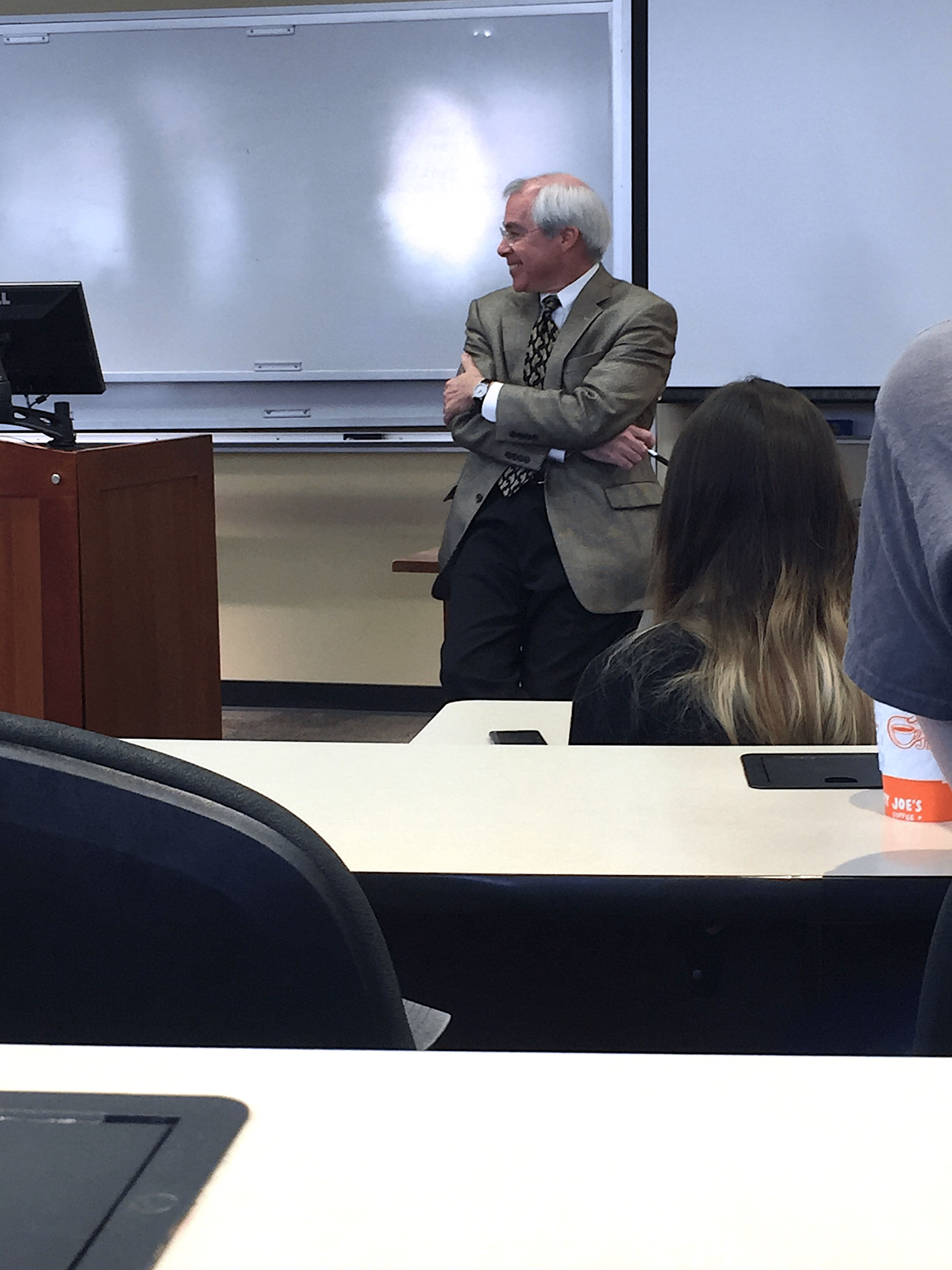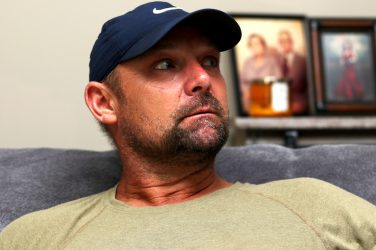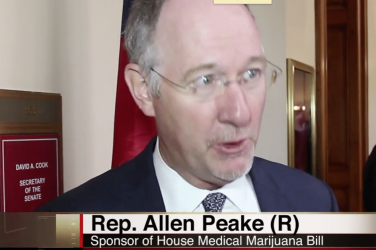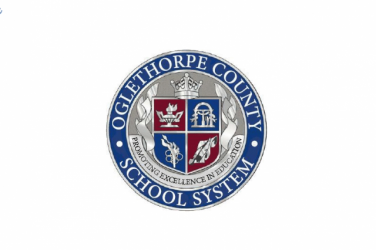John Barrow is smiling widely and walking with a spring in his step as he strolls into Baldwin Hall at exactly 10 a.m. on a cool February morning. It’s right before office hours and the tall, gray-haired teacher is carrying a leather briefcase and wearing old-fashioned sunglasses, dark-wash jeans, and a flannel button up. Barrow enters the temporary office that the School of Public and International Affairs (SPIA) has set up for him. Inside, a particular object signals he is no ordinary professor at the University of Georgia. On the cream-colored wall opposite his desk, a detailed map of Georgia’s 12th voting district hangs — the same district the charismatic and folksy Barrow once represented for a decade as a member of the U.S. House of Representatives and the last-standing Blue Dog Democrat in Congress. The former Congressman, a SPIA graduate himself whose family ties to UGA can be traced back five generations, is currently pioneering a new program as the school’s first Scholar in Residence. The position affords Barrow a one-year teaching position at the University where he instructs The Polarization of American Politics, while also co-lecturing The Legislative Process with Dr. Charles Bullock. “There are things that you simply don’t learn out of a book. You have to have been there. You have to have done it,” explains Dr. Bullock, the distinguished political science professor whose relationship with Barrow goes back a quarter of a century. “Barrow can bring much more of the real world experience than students are going to get out of a book or out of my lectures.”
The former Congressman, a SPIA graduate himself whose family ties to UGA can be traced back five generations, is currently pioneering a new program as the school’s first Scholar in Residence. The position affords Barrow a one-year teaching position at the University where he instructs The Polarization of American Politics, while also co-lecturing The Legislative Process with Dr. Charles Bullock. “There are things that you simply don’t learn out of a book. You have to have been there. You have to have done it,” explains Dr. Bullock, the distinguished political science professor whose relationship with Barrow goes back a quarter of a century. “Barrow can bring much more of the real world experience than students are going to get out of a book or out of my lectures.”
This real world experience on Capitol Hill has given Barrow the precise institutional knowledge of how American democracy works from the inside — a knowledge that is arguably the only way to gain a complete and thorough understanding of Congressional politics. He wants students to then use this knowledge to rearrange their own mental kaleidoscopes of political thoughts and theories in order to allow a new and different pattern to emerge, a pattern only visible when the Congressman’s perspective is brought into the mix. In doing so, Barrow wants to color his students’ incomplete images of Congress and challenge their former assumptions.
In the classroom, Barrow breaks down any former assumptions through realistic accounts of the little-known nuances of the political process he witnessed himself in Washington. Sitting on the wooden table in the middle of the lecture hall, he whispers to the class in his low but distinctly southern twang about how the actual votes are recorded on the House floor through electronic machine and roll-call, the hidden but palpable pressures he faced from both his party and his constituents on bills like Obamacare, the Keystone Pipeline, and Cap and Trade, and the internal conflicts that arose when the two groups’ interests were categorically unaligned with his own beliefs, making it difficult for him to vote on each of those issues. Barrow’s deep voice periodically rises when he jumps to his feet and uses his arms to physically demonstrate a point about gerrymandering, campaign finance, or the rules of procedure.
These issues that Barrow is overtly passionate about are the same ones that directly
affected him during his five terms in Congress. According to The Atlanta Journal Constitution, he fell victim to gerrymandering in 2006 and 2011 when the Republican-controlled Georgia General Assembly redrew the 12th district twice in an attempt to decrease the amount of Democratic voters represented in the region and increase the chance that Barrow would lose his seat in the following elections. “After that I began a long and wandering, disconnected existence as I moved from Athens to Savannah and then from Savannah to Augusta,” says Barrow. “This has been kind of like a homecoming for me.” The current dean of SPIA Dr. Stefanie Lindquist helped make this homecoming possible when she proposed the Scholar in Residence program following Barrow’s final defeat to Republican Rick Allen last year. “We didn’t have anyone else on staff who was actually an elected official,” explains Dr. Lindquist. “Learning about what it is like to actually be in politics and seeing a real person who has done it in the classroom would be a benefit for the students’ education.”
Some students’ fears that the new program would hurl a self-serving or egotistical politician into the shoes of a professor have not come to fruition. Jonathan Hendrix, a student in the class Barrow co-teaches, lowers his frameless glasses to explain how Barrow was able to reverse his initial assumptions. “My impression of Barrow was originally guarded — I don’t trust politicians, generally,” Hendrix admits. “But after introducing myself and listening to his actual lectures, he struck me as one of the good ones, as the type that wanted to actually serve and not just wield power.” Hendrix says that Barrow’s bipartisan voting record in the House and his willingness to criticize both parties in class helps assure him that Barrow isn’t trying to push any specific partisan agenda onto his students.
Jared Samuels, another student of Barrow’s, viewed him as genuine from the beginning: “Barrow understands the topics and understands that he is not a professor, but someone who is here to give us his take on these first-hand experiences.” Samuels is referring to the idea that perhaps not being a “standard professor” is precisely what allows Barrow to impart the type of real-world knowledge on his students that extends beyond the classroom. His quirky advice comes in a variety of forms, from direct quotes — “Don’t try and pound a square peg of ambition into a round hole of opportunity” — from the general lessons he learned in his ten years in Congress like how to anticipate and confront the opposition, the power of perseverance, how to react when the government mishandles an issue, and why effective communication is essential to winning arguments.
Back in Baldwin Hall, Barrow’s office hours are about to begin. His tone becomes more serious as he looks down and wonders how successful he’s been at helping students understand what really goes on in Washington. But the Scholar in Residence is comforted by the fact that he still has until May to fully complete this mission, after which he says he’ll probably go back to practicing law: “The nice thing about this program is that it gives me a chance to make a meaningful contribution without having to foreclose any options down the road.”
By Ariel Pinsky







Show Comments (0)